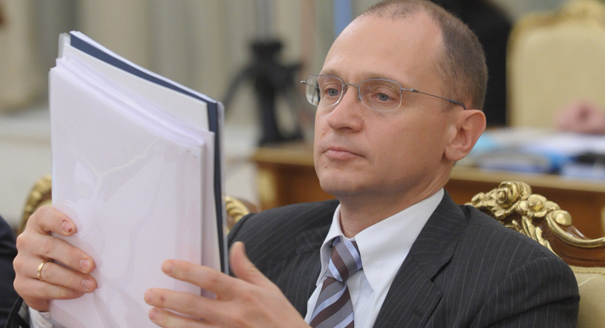The decision to appoint Sergei Kiriyenko as first deputy chief of staff of the presidential administration, the Kremlin official responsible for domestic policy, fits well into the broader personnel policy that Putin has recently put into motion: Putin’s friends and representatives of the old political elite are being replaced by technocrats and people beholden to the president.
At first glance, Sergei Kiriyenko is a perfect fit for the new guard: he was last employed by Rosatom, the Russian state nuclear corporation, which operates outside the political realm. He also served for a short time as prime minister before the 1998 default, further boosting his technocratic credentials.
But Kiriyenko isn’t just a technocrat; he has discernable ideological predilections, subscribing to the teachings of Russian philosopher Georgy Shchedrovitsky, who founded the “Moscow Methodological Circle.” Shchedrovitsky’s ideas gained traction in the late 1950s and had resonance through Khrushchev’s thaw, Brezhnev’s stagnation, and Gorbachev’s perestroika—right up until his death in 1994.
Shchedrovitsky essentially viewed human beings as machines that must be programed to perform certain functions—essentially, the theory of “social engineering.” The literary scholar Ilya Kukulin has found some similarities between Shchedrovitsky’s philosophy and the works of Soviet-era science fiction writers Arkady and Boris Strugatsky: most of their novels feature a “progressor,” a man who finds himself in the past or on a backward planet and eventually changes the world around him.
In effect, Shchedrovitsky and his followers were themselves progressors. They made no secret of their intent to influence government decisions, and it’s quite possible that Shchedrovitsky’s followers played a role in perestroika in the 1980s, since thousands of people had been exposed to his philosophy by this time.
The members of the Methodology Circle, including Shchedrovitsky’s son Peter, have long counseled Sergei Kiriyenko. Among other methodologists close to the Kremlin’s new domestic policy czar is the “humanitarian technologist” Yefim Ostrovsky.
In the late 1990s and early 2000s, Shchedrovitsky’s methodologists worked actively on formulating the concept of the “Russian world.” Since the annexation of Crimea and the armed conflict in eastern Ukraine, this concept has taken on a different meaning. New advocates of the “Russian world” like Igor Strelkov and Konstantin Malofeyev believe Russia should regain its lost imperial territory, that Russia is where Russian is spoken.
Shchedrovitsky had something completely different in mind. His followers’ “Russian world” is also centered around language, but that’s where the similarities end. Territory doesn’t matter to Shchedrovitsky’s disciples; they see state borders as obsolete in the context of the new global economy: “The new Russian world is not an encroaching one seeking new lands. The new Russian world is a rising one that unfurls new images of the future,” wrote Peter Shchedrovitsky, Ostrovsky, and Kiriyenko.
In their view, apart from becoming an economic leader (which is, of course, essential), Russia needs to set an example in developing “thinking” and “humanitarian technologies,” including tools that can help “manage” society. Adherents claim they don’t want to manipulate public consciousness, saying that “humanitarian technologies do not govern people; rather, they govern the rules and frameworks of their communication and interaction.”
Ideology is also important to Georgy Shchedrovitsky’s adherents. “When a person is deprived of higher purposes, he is not designated for any place and not directed anywhere; he twitches right and left and lives in a kind of Brownian motion. He lacks direction. The thing is, I have always treated ideology in the same way computer programmers treat Windows as an ideology. It’s a meta-project, the project of all projects,” says Yefim Ostrovsky. He believes that a small group of technologists could formulate an ideology with the potential to determine the outlook of the entire country.
And there are other reasons to think Kiriyenko won’t act as a run-of-the-mill technocrat. Peter Shchedrovitsky clearly disagreed with the technocratic approach, writing that “false objectives and concepts are at the core of the collapse of the Soviet project in the 1970s and 1980s. Many of them became popular back in the late nineteenth-early twentieth century. Most notably, it was ‘technocratism’ in understanding the processes of social reproduction and development, as well as underestimating cultural factors and cultural resources in human history.”
Knowing all this, it’s hard to see Sergei Kiriyenko as an average technocrat who will simply carry out orders. His record in government bears this out: as a presidential envoy, Kiriyenko brought new ideas to the table, establishing the institution of federal inspectors in his district, which was subsequently adopted by the Kremlin, for example.
The Shchedrovitsky methodologist always tries to bend reality to his liking. He thinks he is strong and knowledgeable enough to do so. He doesn’t just do what his superior wants; the superior himself can become an object of his influence. Most likely, Sergei Kiriyenko’s current role involves carrying out a specific large-scale task, perhaps organizing early presidential elections, changing the constitution, or restructuring the government in light of the current economic crisis and the decline of the president’s job approval ratings. But we shouldn’t expect Kiriyenko to blindly follow orders. He might just come up with unorthodox ways to alter the world around him.
